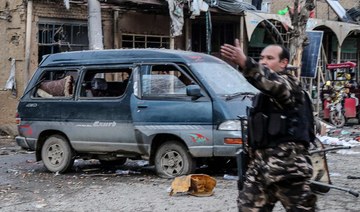DUBAI: The summit of the G20 nations assembling in Buenos Aires comes at a crucial time in world affairs, as well as a critical juncture in the economy of its host nation, Argentina.
For Saudi Arabia too, the meeting comes at an important crossroads – an opportunity to move its economic transformation strategy onto another level in the face of challenges at home and abroad.
While public perception of the G20 is based on the power-play politics on display over the traditional 48 hours of summitry, behind the scenes the gathering is a forum for the resolution of economic and financial issues.
The two days of in-your-face events are preceded by more discreet meetings of business leaders and financial officials — the legendary “sherpas” — from the member countries and their invitees; their discussions are decidedly economic, rather than political; their implicit agenda is to maintain economic stability within the existing financial framework.
Maybe this is why, over the course of the 10-year history of the G20, it has attracted more criticism and opposition from the left wing, and physical opposition from violent extremists, than any other multinational gathering.
The G20 is unashamedly a club of capitalists, even when its most populous member and second biggest economy, China, is still nominally a communist economy. In its decade in the capitalist inner sanctum, China has proven just as orthodox a capitalist as any of the other members, including the standard bearer of free enterprise, the US.
In 2009 at the G20 in Pittsburgh, China joined with the US to bail out the world with an expansionist program after the global financial crisis had led it to the brink, declaring itself a committed member of the club.
How different the atmosphere is in Buenos Aires. The global economic system seems to be on the point of fracture again, but this time there seems little chance of a US-China double act coming to the rescue.
The Costa Salguero Center on the edge of the Rio de la Plata will be the venue for the first meeting between US President Donald Trump and Chinese President Xi Jinping since, earlier this year, the former fired the opening shots in the “trade war” going on between them by declaring his intention to impose $250 billion of tariffs on Chinese imports.
China retaliated with its own tariffs, and there is a danger that the confrontation — which some American officials describe as merely a “skirmish” — will descend into a full-scale battle next year, when the tariffs take effect.
That would have serious consequences for a global economy that is looking increasingly fragile amid concerns that the financial system, too, is laboring under a weight of increased debt and overinflated asset prices.
China recently held out an olive branch, with deputy president Wang Qishan declaring his readiness to enter serious negotiations to avoid a breakdown in the global trade system. The hope is that Trump will hold off formally applying the tariffs in January.
But in Buenos Aires, nobody is expecting too much from the dinner that the two presidents have arranged on Friday night.
By then, the first full day of the summit will have been completed, and President Mauricio Macri of Argentina will be hoping that it has gone off without the major incidents that have been threatened by home-grown and international agitators.
If there was a repeat of the serious football-related violence that broke out in Buenos Aires recently, it would take the shine off his attempts to claim that Argentina had turned a corner in its economic troubles, in the run-up to presidential elections next year.
Macri was elected three years ago in a burst of optimism that his reformist policies would put the Argentine economy on the road to stability after years of boom-and-bust cycles, interspersed corruption scandals, and domestic unrest.
For a while it seemed to be working, and winning the G20 was seen as a mark of approval by the international community for his presidency.
But recently the old Argentine malaise has come back with a vengeance. The peso has lost 50 percent of its value against the dollar this year, Argentine financial markets have been chaotic, and inflation has soared to more than 30 percent per annum. Some Argentinians complain they cannot afford steak.
Macri has stabilized the situation in recent weeks, with the IMF giving its blessing in a series of measures to stabilize the economy and the financial system.
But Argentine citizens are still having to live with an austerity program that threatens their standard of living, and it would not take much for ordinary citizens — the ones who have not taken Macri’s advice to have a long weekend away from Buenos Aires — to join protests that could easily descend into violent confrontation as the G20 leaders meet.
That would be an embarrassment for Macri in front of his fellow leaders, and would also distract from the rest of the very worthy G20 program.
While the media is salivating for a Trump-Xi confrontation on trade, more fireworks on climate change and street protest, the compilers of the G20 program have actually put together a formal agenda that reflects some of the other genuine concerns of the international community.
The theme of the Buenos Aires G20 — as it is the case increasingly with international forums from Davos to Singapore — is sustainability. The world has to live within it means, both in terms of energy, environment, society and finance.
The Argentine G20’s self-declared goals are to focus solutions on the future of work, infrastructure for development, viable food production and consumption, and the inclusion of more women in the global workforce, all against the backdrop of the rapid technological change turning most aspects of the economic process on its head.
That coincides with many of the goals of Saudi Arabia’s Vision 2030, which Saudi policymakers — led by Crown Prince Mohammed bin Salman — will be at pains to stress is still on track in Buenos Aires. The event gives the opportunity to reassert the project’s credentials on the international stage after a period of uncertainty in crucial global energy markets and changes in the international perception of the Kingdom.
Some aspects of the Vision 2030 program — like the initial public offering of Saudi Aramco originally slated for next year — have been modified in line with changing circumstances, and lower oil prices threaten to alter the fiscal mathematics for the Kingdom’s economic policymakers.
As the biggest economy in the Middle East, a leading oil producer and a long-standing member of the G20, Saudi Arabia will retain its role and its influence in Buenos Aires. The top-level delegation will be working hard behind the scenes, at the bilateral and “retreat” events at the summit center, to argue its case among its global peers.
It all promises to be an instructive lesson in the stagecraft, and statecraft, that goes into hosting a G20 summit, which, after a move to Japan next year, is planned to be held in Saudi Arabia in 2020, its first time in the Middle East.
Why the G20 matters now for both Saudi Arabia and the international community
Why the G20 matters now for both Saudi Arabia and the international community

- The world is hoping the US and China will resolve their trade war
- Saudi Arabia will showcase Vision 2030 on the global stage
Afghan returnees in Bamiyan struggle despite new homes

- More than five million Afghans have returned home since September 2023, according to the International Organization for Migration
BAMIYAN, Afghanistan: Sitting in his modest home beneath snow-dusted hills in Afghanistan’s Bamiyan province, Nimatullah Rahesh expressed relief to have found somewhere to “live peacefully” after months of uncertainty.
Rahesh is one of millions of Afghans pushed out of Iran and Pakistan, but despite being given a brand new home in his native country, he and many of his recently returned compatriots are lacking even basic services.
“We no longer have the end-of-month stress about the rent,” he said after getting his house, which was financed by the UN refugee agency on land provided by the Taliban authorities.
Originally from a poor and mountainous district of Bamiyan, Rahesh worked for five years in construction in Iran, where his wife Marzia was a seamstress.
“The Iranians forced us to leave” in 2024 by “refusing to admit our son to school and asking us to pay an impossible sum to extend our documents,” he said.
More than five million Afghans have returned home since September 2023, according to the International Organization for Migration (IOM), as neighboring Iran and Pakistan stepped up deportations.
The Rahesh family is among 30 to be given a 50-square-meter (540-square-foot) home in Bamiyan, with each household in the nascent community participating in the construction and being paid by UNHCR for their work.
The families, most of whom had lived in Iran, own the building and the land.
“That was crucial for us, because property rights give these people security,” said the UNHCR’s Amaia Lezertua.
Waiting for water
Despite the homes lacking running water and being far from shops, schools or hospitals, new resident Arefa Ibrahimi said she was happy “because this house is mine, even if all the basic facilities aren’t there.”
Ibrahimi, whose four children huddled around the stove in her spartan living room, is one of 10 single mothers living in the new community.
The 45-year-old said she feared ending up on the street after her husband left her.
She showed AFP journalists her two just-finished rooms and an empty hallway with a counter intended to serve as a kitchen.
“But there’s no bathroom,” she said. These new houses have only basic outdoor toilets, too small to add even a simple shower.
Ajay Singh, the UNHCR project manager, said the home design came from the local authorities, and families could build a bathroom themselves.
There is currently no piped water nor wells in the area, which is dubbed “the dry slope” (Jar-e-Khushk).
Ten liters of drinking water bought when a tanker truck passes every three days costs more than in the capital Kabul, residents said.
Fazil Omar Rahmani, the provincial head of the Ministry of Refugees and Repatriation Affairs, said there were plans to expand the water supply network.
“But for now these families must secure their own supply,” he said.
Two hours on foot
The plots allocated by the government for the new neighborhood lie far from Bamiyan city, which is home to more than 70,000 people.
The city grabbed international attention in 2001, when the Sunni Pashtun Taliban authorities destroyed two large Buddha statues cherished by the predominantly Shia Hazara community in the region.
Since the Taliban government came back to power in 2021, around 7,000 Afghans have returned to Bamiyan according to Rahmani.
The new project provides housing for 174 of them. At its inauguration, resident Rahesh stood before his new neighbors and addressed their supporters.
“Thank you for the homes, we are grateful, but please don’t forget us for water, a school, clinics, the mobile network,” which is currently nonexistent, he said.
Rahmani, the ministry official, insisted there were plans to build schools and clinics.
“There is a direct order from our supreme leader,” Hibatullah Akhundzada, he said, without specifying when these projects will start.
In the meantime, to get to work at the market, Rahesh must walk for two hours along a rutted dirt road between barren mountains before he can catch a ride.
Only 11 percent of adults found full-time work after returning to Afghanistan, according to an IOM survey.
Ibrahimi, meanwhile, is contending with a four-kilometer (2.5-mile) walk to the nearest school when the winter break ends.
“I will have to wake my children very early, in the cold. I am worried,” she said.















